Neuroscience
-
 Neuroscience
NeuroscienceHints of how the brain “sees” dreams emerge
Nerve cells that make sense of visual input keep chugging away during REM sleep, suggesting that these cells may help a sleeper “see” dreams.
-
 Neuroscience
NeuroscienceHints of how the brain “sees” dreams emerge
Nerve cells that make sense of visual input keep chugging away during REM sleep, suggesting that these cells may help a sleeper “see” dreams.
-
 Health & Medicine
Health & MedicineFish oil may counter schizophrenia
Three months of omega-3 fatty acids protects against psychosis for years, a small study suggests.
-
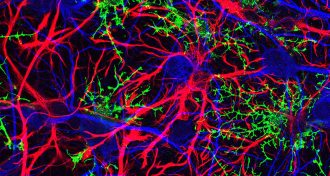 Neuroscience
NeuroscienceRethinking which cells are the conductors of learning and memory
Brain cells called glia may be center stage when it comes to learning and memory, recent research suggests.
-
 Neuroscience
NeuroscienceA voyage into Parkinson’s disease, led by patient and journalist
Jon Palfreman’s Brain Storms explores Parkinson’s disease in the past, present and future.
-
 Animals
AnimalsPower of pupils is in their shape
Horizontally or vertically stretched pupils may provide predators and prey with visual advantages.
-
 Neuroscience
NeuroscienceBrain scans hint at reasons for stress-eating
Moderate stress changes brain behavior in ways that may lead to poor food choices.
-
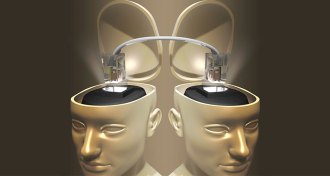 Neuroscience
NeuroscienceClaim of memory transfer made 50 years ago
Scientist’s claims of transferred memories were more fiction than fact.
-
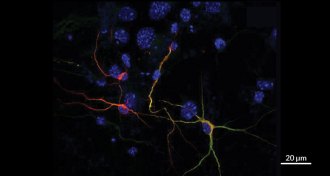 Life
LifeChemical magic transforms skin cells into nerve cells
Just a few chemicals can transform skin cells from Alzheimer’s patients and healthy people into nerve cells.
By Meghan Rosen -
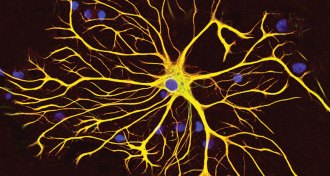 Neuroscience
NeuroscienceAstrocytes help speed up brain’s messages
Astrocytes may help speed nerve cells’ electrical messages.
-
 Animals
AnimalsCaterpillar treats and tricks ants by oozing spiked juice
Caterpillars ooze droplets that lure ants away from colony duties to instead lick and defend their drug source, new lab tests suggest.
By Susan Milius -
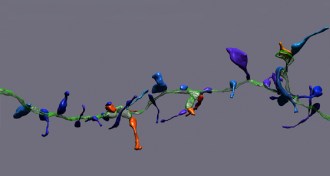 Neuroscience
NeuroscienceNew view of mouse brain provides up-close look at nerve cells’ habitat
Detailed reconstruction of a tiny fleck of mouse brain reveals neural complexity.